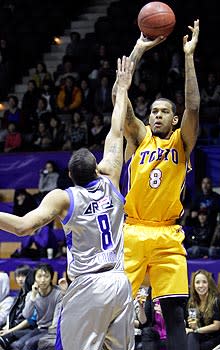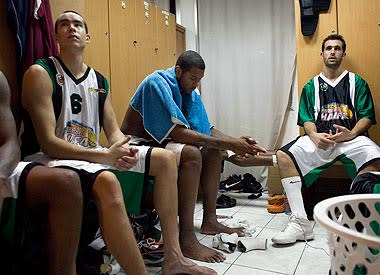Tyler says he’s grown from journey
LOS ANGELES – Three years ago, the top college prospect for the class of 2010 was not Kyrie Irving, Harrison Barnes, Jared Sullinger or Brandon Knight. It was Jeremy Tyler, a center at San Diego High School who was expected to be the best prep big man in years.
Tyler, however, skipped his senior season in high school to play professionally in Israel and Japan – a decision that was met with criticism as soon as he struggled overseas. He’s now eligible for next month’s NBA draft and has no regrets about his unusual journey.
“I’m a much better player now than if I would have finished my senior year and went to college,” Tyler told Yahoo! Sports after a workout last Thursday. “I can’t say that’s for everyone because everyone is different. But I feel like the best for me was to make that decision. I don’t regret it.”
NBA scouts project Tyler to be taken late in the second round to late in the first, depending on how his workouts with teams go. Few think he'll be a lottery selection, something that seemed a near certainty when he was a junior in high school.
“I don’t see him being a top pick in this draft,” an Eastern Conference general manager said. “Could he have accomplished something different taking a different path? One will never know. He chose that direction. It was an unconventional one and it will be looked at as a case study for years to come.”
Rivals.com ranked Tyler as the nation’s top player in his class after his sophomore season. He was expected to eventually become a McDonald’s All-American after his senior year. The 6-foot-10 forward/center committed to the University of Louisville.
Tyler, however, created a stir when he left before his senior year in high school to sign a one-year, $140,000 contract to play for Maccabi Haifa of the respected Israel Premier League. Just 18 years old, he was the first American to leave high school early to play professionally overseas. He did not graduate from San Diego High, but plans to eventually get his GED. Tyler arrived in Israel with high expectations, riding a wave of publicity.
“I knew it was going to be a very tough journey,” Tyler said. “I knew if you go to college you could be No. 1 like you were in high school. But I just wanted to take a different road, do something out of the ordinary, do something uncommon.”
From the start, Tyler’s experiment was more difficult than even he thought. Not only did he not work his way into the starting lineup in Israel, he scored just one point in his first two games and barely played. He averaged only 2.1 points and 1.9 rebounds in 7.6 minutes per game through 10 games. During one game, he walked out on his team at halftime, frustrated over his lack of playing time. He spent the last three games sitting on the bench in street clothes after being left off the roster. Eventually, he left Israel and returned home to San Diego.
“It just got really bad,” Tyler said. “I wasn’t playing at all and barely even practicing. [Haifa coach Avi Ashkenazi] wouldn’t even use me for practice or anything. I didn’t have gym time to go to on my own. It was just a bad situation.”
In a 2009 New York Times article, Ashkenazi called Tyler out of shape. The team captain also called him soft. Tyler was portrayed as naïve and immature. He was also fined $1,000, the largest penalty the club levied in three years, for missing a workout and showing up late for an interview.
“The question is whether he’ll take responsibility of his career,” Ashkenazi told The New York Times. “If he thinks he’s going to be in the NBA because his name is Jeremy Tyler and he was a very good high school player, he will not be.”
Tyler now says the experience humbled him. He has worked to become more professional.
“It was definitely a learning process and a building year," Tyler said, "a lot of misunderstandings with me just kind of getting into the game of professional basketball. The work ethic was there. I worked hard every day and came to work every day. There were little things that were blown out of proportion, being late to an interview or being late to a practice because I didn’t have a ride.
“At the end of it, it doesn’t matter the reason why. There are no gray areas, either. It’s black or white. I took everything out of that year that I was supposed to. Everything I did wrong that year, I focused on not doing it the next year.”
Because he was paid to play in Israel, Tyler couldn’t play in college. He began repairing his image by making the all-star team at the Adidas Eurocamp in Treviso, Italy, in June 2010. He played in Japan for the Tokyo Apaches.
Japan’s professional league isn’t on the sport’s preeminent level. The Apaches also played in the league’s second tier. But the move gave Tyler the opportunity to be coached by Bob Hill, former coach of the Indiana Pacers, San Antonio Spurs and Seattle SuperSonics.
“Bob Hill has been a great asset in my life,” Tyler said. “He … gives me all the knowledge I need.”
Tyler averaged 9.9 points and 6.4 rebounds in 15.4 minutes through 33 games for the Apaches. But he showed steady improvement, averaging 16.2 points and 7.6 rebounds in the last five games, including a season-high 24 points and 11 rebounds in his season finale on March 10.
Hill sees Tyler as more of a power forward than a center and thinks he has the footwork to guard small forwards.
“He got better across the board in Japan,” Hill said. “He really matured on the floor a little bit. He’s still a 19-year-old kid and he’s on his way to realizing what he can become as a basketball player.”
Tyler’s season in Japan ended early after the earthquake and tsunami hit in March. The Apaches canceled their season, and Tyler returned home to the United States.
“It was crazy,” Tyler said. “I was there for about six days afterward. There were earthquakes every single day, every 15, 20 minutes there were little ones and then big ones. At night it was hard to sleep.”
Tyler recently spent a month working out with Hill in San Antonio. He’s also attending this week’s draft combine in Chicago. He’ll then return to San Antonio to spend more time with Hill before working out for NBA teams before the draft.
“When he came to San Antonio this spring he came here with a real purpose, really came to work and got better,” Hill said. “I would think NBA people are going to see that this kid has a big upside and he’s going to be a terrific player in the NBA.”
Several NBA executives said they don’t know much about Tyler, but look forward to seeing him in Chicago. One Western Conference assistant GM believes Tyler will receive consideration from teams drafting late in the first round because of his size, potential, age – and the lack of overall talent in this year’s draft.
“It’s a mystery as to how good he is right now because he only played recently in Japan and you don’t know how much improvement he’s made,” one Western Conference executive said.
Tyler’s dream is to shake the hand of NBA commissioner David Stern at the draft, three days before his 20th birthday. That means Tyler better hope he’s taken in the first round.
“If I get drafted its going to be perfect because I’ve been through the worst of the worst,” Tyler said. “I know the NBA is going to be a tough road, but I know I’m going to be prepared for it.”



